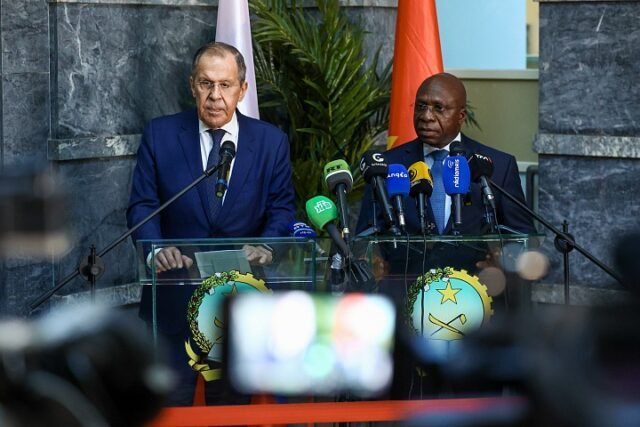
Sergei Lavrov: The African Explorer
Publication: Eurasia Daily Monitor Volume: 20 Issue: 32
By:

As part of efforts to find friends overseas as the Kremlin’s all-out aggression against Ukraine drags on, Moscow’s previously growing efforts to ensconce its influence in Africa have only intensified. The most recent example of Russia’s multi-dimensional campaign in Africa was Foreign Minister Sergei Lavrov’s January 2023 trip to South Africa, Angola, Eswatini and Eritrea, which may in some sense be called a “voyage of exploration.” Specifically, he came to explore how Russian influence in Africa may be enhanced using Moscow’s traditional instruments—namely, security cooperation, trade assistance, arms sales, offering educational scholarships in Russia, providing political support to embattled autocrats or would-be strongmen, as well as expanding Russia’s already massive information campaign throughout the continent (Mid.ru, January 23; Euractiv, February 2). Lavrov also sought to lay the groundwork for a second successful Russia-Africa summit slated to take place later this year, an event which would help demonstrate Russia’s increased clout and influence across the continent (Mid.ru, January 23).
Lavrov also clearly aimed to emphasize the Kremlin’s ideological line. To that end, while visiting Angola, Lavrov asserted that Moscow’s war in Ukraine resembled Angola’s struggle for independence while lauding Angola and other African states for seeing through US and Western neocolonialism and throwing off the yoke of colonialism that allegedly dominates Western policy in Africa (Mid.ru, January 25). Lavrov harped on this message consistently throughout his Africa visit and even after his return home in conversations with Egyptian Foreign Minister Sameh Shoukry. He denounced so-called “Western machinations” in the Minsk peace talks of 2015 and inveighed against the Western position on Ukraine (Mid.ru, January 31). The Russian foreign minister also hoped to reiterate that somehow Moscow was not responsible for the blockade of the Black Sea, as he mentioned during his Africa tour last year, which has generated an enormous global food crisis with particular salience in Africa (Radio Free Europe/Radio Liberty, July 24, 2022).
These messages were and are entirely consistent with the larger tropes and messaging that Moscow has repeatedly stressed since Russia’s full-scale war against Ukraine began. They also reflect elements of Russia’s new foreign policy orientation, emphasizing its ideological and political affinity with the Global South, not least Africa (see EDM, January 6). However, Lavrov did not visit these countries merely to shore up their support for Moscow in the United Nations and other international arenas or to facilitate the upcoming summit. Perhaps the most important part of the trip’s agenda was to discuss military relations, representing one of Moscow’s most enduring strategic objectives.
To that end, in both Angola and Eritrea, Lavrov discussed the importance of port access for Russian ships (Eurasia Review, January 31). While the request for port access in Angola, with the obvious intent of establishing some form of a regular (if not permanent) naval presence in the south Atlantic Ocean, is new, the quest for military bases in the Horn of Africa and the Red Sea dates back to Leonid Brezhnev’s rule of the Soviet Union—the apogee of Soviet power projection. Indeed, a German Foreign Office report from 2020 stated that Russia sought to establish bases in Mozambique, Eritrea and Sudan (Tesfa News, August 5, 2020). Along with a recent agreement reached with Sudan to establish a Russian base on the Red Sea, Russia’s efforts in Eritrea demonstrate that Moscow’s ambitions to expand its influence in the Red Sea, Arabian Sea and Indian Ocean are very much alive (Radio Free Europe/Radio Liberty, February 11).
Perhaps most indicative of these ambitions was the fact that Lavrov’s talks with Eritrean Foreign Minister Osman Mohammed took place in the port city of Massawa, not in the capital Asmara. Furthermore, Lavrov announced Russia’s readiness to support Eritrea’s defense and security needs (Mid.ru, January 27). Although he framed his remarks in a business context, the Russian foreign minister stated, “[Russia] will have to conduct an in-depth assessment of the logistics potential of the Massawa seaport and airport. The latter is quite interesting in terms of its transit potential.”
In a similar vein, Fyodor Lukyanov, one of Russia’s leading foreign policy intellectuals, commented that Qatar and the United Arab Emirates—the latter of which having used Eritrea as a base for military operations in Yemen according to Lukyanov—are interested in “the emergence of new players in the Red Sea region aside from the United States, in particular Russia and China.” The Russian intellectual also maintained that, as part of its turn to the Global South, Russia is interested in adding military bases, as a Russian presence strengthens Moscow’s position and adds guarantees for Russian businesses (Vedomosti, January 24).
Given this quest for hard power, despite all its anti-imperialist rhetoric, the fact remains that Russia, the largest and longest-running empire in the world, has gone back to classic gunboat diplomacy. Presumably African leaders recognize the disparity between rhetoric and reality here; but beyond this, the West must recognize the fully multi-dimensional character of Russia’s Afrikapolitik and act to thwart it. Setting aside flowery diplomacy and policy, one finds an obsessive Russian delusion with being a global great power even as the material basis for this imperial fantasy is being destroyed by Putin’s insensate war. But as the war also shows, the pursuit of this ongoing delusion can wreak havoc globally. Therefore, it must be countered early on wherever it is found, be that in Ukraine, Africa or elsewhere.



